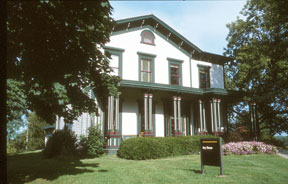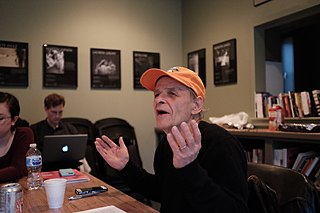
The Iowa Writers' Workshop, at the University of Iowa, is a celebrated graduate-level creative writing program in the United States. The writer Lan Samantha Chang is its director. Graduates earn a Master of Fine Arts (MFA) degree in Creative Writing. It has been cited as the best graduate writing program in the nation, counting among its alumni 17 Pulitzer Prize winners.
Creative writing is any writing that goes outside the bounds of normal professional, journalistic, academic, or technical forms of literature, typically identified by an emphasis on narrative craft, character development, and the use of literary tropes or with various traditions of poetry and poetics. Due to the looseness of the definition, it is possible for writing such as feature stories to be considered creative writing, even though they fall under journalism, because the content of features is specifically focused on narrative and character development. Both fictional and non-fictional works fall into this category, including such forms as novels, biographies, short stories, and poems. In the academic setting, creative writing is typically separated into fiction and poetry classes, with a focus on writing in an original style, as opposed to imitating pre-existing genres such as crime or horror. Writing for the screen and stage—screenwriting and playwriting—are often taught separately, but fit under the creative writing category as well.

Northeast Ohio Medical University (NEOMED) is a public medical school in Rootstown, Ohio, United States. The university specializes in graduate education in medicine and pharmacy but also has a College of Graduate Studies.
A low-residency program is a form of education, normally at the university level, which involves some amount of distance education and brief on-campus or specific-site residencies—residencies may be one weekend or several weeks. These programs are most frequently offered by colleges and universities that also teach standard full-time courses on campus. There are numerous Master's degree programs in a wide range of content areas; one of the most popular limited residency degree programs is the Master of Fine Arts in creative writing. The first such program was developed by Evalyn Bates and launched in 1963 at Goddard College in Plainfield, Vermont.
Richard Hague is an American poet and writer.
Mid-American Review (MAR) is an international literary journal dedicated to publishing contemporary fiction, poetry, nonfiction, and translations. Founded in 1981, MAR is a publication of the Department of English and the College of Arts & Sciences at Bowling Green State University. It is produced by faculty, students, and alumni of Bowling Green's creative writing program.
K. L. Cook is an American writer from Texas. He is the author of Last Call (2004), a collection of linked stories spanning thirty-two years in the life of a West Texas family, the novel, The Girl From Charnelle (2006), and the short story collection, Love Songs for the Quarantined (2011). His most recent books are a collection of short stories, Marrying Kind (2019), a collection of poetry, Lost Soliloquies (2019), and The Art of Disobedience: Essays on Form, Fiction, and Influence (2020). He co-directs the MFA Program in Creative Writing & Environment at Iowa State University and teaches in the low-residency MFA in Writing Program at Spalding University.
Maggie Anderson is an American poet and editor with roots in Appalachia.

The Texas State University MFA Program at Texas State University in San Marcos, Texas, is a three-year graduate-level creative writing program in the United States. Fiction writer Doug Dorst is currently the director of the program. The faculty includes many award-winning writers.
John Gallaher is an American poet and assistant professor of English at Northwest Missouri State University, and co-editor of The Laurel Review, supported by Northwest's English Department. He is the author or co-author of five poetry collections, most recently, In a Landscape. His honors include the 2005 Levis Poetry Prize for his second book, The Little Book of Guesses. His poetry has been published in literary journals and magazines including Boston Review, Colorado Review, Crazyhorse, Field, The Literati Quarterly, jubilat, The Journal, Ploughshares, and in anthologies including The Best American Poetry 2008.

Mary Biddinger is an American poet, editor, and academic.
The Stonecoast MFA Program in Creative Writing is a graduate program in creative writing based at the University of Southern Maine in Portland, Maine, United States. Stonecoast enrolls approximately 100 students in four major genres: creative nonfiction, fiction, poetry, and popular fiction. Other areas of student interest, including literary translation, performance, writing for stage and screen, writing Nature, and cross-genre writing, are pursued as elective options. Students also choose one track that focuses an intensive research project in their third semester from among these categories: craft, creative collaboration, literary theory, publishing, social justice/community service, and teaching/pedagogy. Stonecoast is one of only two graduate creative writing programs in the country offering a degree in popular fiction. It is accredited through the New England Association of Schools and Colleges (NEASC).
Frank Giampietro is an American poet. He is interim director of the Cleveland State University Poetry Center, visiting assistant professor of poetry at Cleveland State University, and the Northeast Ohio Master of Fine Arts Program (NEOMFA) program. He is author of Begin Anywhere. He was the 2010-2012 resident scholar at The Southern Review and has had poems, book reviews, and nonfiction published in many literary journals and magazines including 32 Poems, Cimarron ReviewColumbia Poetry Review, CutBank, Exquisite Corpse, Fence, Hayden's Ferry Review, Ploughshares, Cimarron Review and Rain Taxi. His honors include a 2008 Florida Book Award, a fellowship from Sewanee Writers' Conference, and a Kingsbury Fellowship from Florida State University. He is creator and editor of two literary websites, La Fovea and Poems by Heart. Giampietro earned an MA from Washington College, an MFA from Vermont College of Fine Arts, and a PhD in English from Florida State University. He lives in Farmington, Maine with his wife, the potter, Cherie Giampietro and two children.

Dzvinia Orlowsky is a Ukrainian American poet, translator, editor, and teacher. She received her BA from Oberlin College and her MFA from the Warren Wilson College MFA Program for Writers. She is author of six poetry collections including Convertible Night, Flurry of Stones for which she received a Sheila Motton Book Award, and Silvertone (Carnegie Mellon University Press, 2013) for which she was named Ohio Poetry Day Association's 2014 Co-Poet of the Year. Her first collection, A Handful of Bees, was reprinted in 2009 as a Carnegie Mellon University Classic Contemporary. Her sixth, Bad Harvest, was published in fall of 2018 and was named a 2019 Massachusetts Book Awards “Must Read” in Poetry.
Larry R. Smith is a poet, fiction writer, literary biographer, translator, essayist and reviewer.

Philip Metres is an American writer.
Ricardo "Ricky" M. De Ungria is a Filipino poet.

Geffrey Davis is an American poet and professor. He is the author of Revising the Storm and Night Angler. He teaches in The Arkansas Programs in Creative Writing & Translation at the University of Arkansas and lives in Fayetteville, Arkansas with his wife and son. He also serves on the poetry faculty at the Rainier Writing Workshop, a low-residency MFA program at Pacific Lutheran University.

Meg Johnson is an American poet and lecturer. Her poems have appeared in numerous literary magazines, including Midwestern Gothic, Slipstream Magazine, Word Riot, Hobart, and many others. Her first collection of poems, Inappropriate Sleepover, was released in 2014, her second collection, The Crimes of Clara Turlington, was released in December 2015., and her third book, Without: Body, Name, Country is due to release in September 2020. She is also the current editor of the Dressing Room Poetry Journal.
The Northwest Institute of Literary Arts (NILA) was a non-profit 501(c)3 Master of Fine Arts in Creative Writing low-residency program founded by the Whidbey Island Writers Association, in operation for twelve years, from 2005 to 2016. Beginning with an enrollment of nine students, the NILA MFA program grew to a peak enrollment of 62 students in 2014. Also known as the Whidbey Writers Workshop MFA, the low residency program was taught by the following regular faculty: Kathleen Alcalá, Bonny Becker, Carmen T. Bernier-Grand, Stephanie Bodeen, Andrea Brown, Lawrence W. Cheek, Gary Copeland Lilley, Jerry Gabriel, Kate Gale, Melissa Hart, Bruce Holland Rogers, Christopher Howell, Andrea Hurst, Kirby Larson, Lisa Dale Norton, Derek Sheffield, Ana Maria Spagna, Wayne Ude, Sarah Van Arsdale, David Wagoner, Carolyne L. Wright, and Susan Zwinger. Each semester began with intensive in-person residencies offering morning classes in craft, workshop, and directed reading, and afternoon sessions on the profession of writing. The three hours of afternoon classes were taught by guest faculty, bestselling authors and renowned agents, editors, and writing industry professionals. At the end of residency, students returned home to complete the rest of the semester via online class forums.







